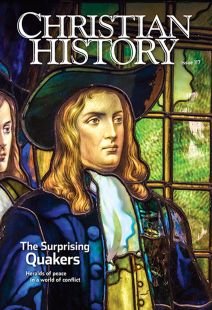Unforgettable witness for freedom
Order Christian History #117: The Surprising Quakers in print.
Subscribe now to get future print issues in your mailbox (donation requested but not required).
JOHN WOOLMAN (1720–1772), fourth child and eldest son of a family of 13 in colonial New Jersey, set a high standard for antislavery witness through his antislavery essays and writings. His eloquent and searching Journal, published posthumously in 1775, has never been out of print. At age 19 Woolman was asked by another Quaker to write a bill of sale for an African American woman. Woolman felt prompting from his conscience not to do so, but, he said, “through weakness, I gave way and wrote it.” Young Woolman took the opportunity, though, to tell the other Quaker that he felt slavery was incompatible with Christianity.
Woolman would not give into any such weakness again. His essays and spoken ministry persuaded Quakers in the Delaware River Valley and elsewhere to take increasingly stronger stands against slavery. In Philadelphia Yearly Meeting, Woolman served on several committees urging Quaker slaveholders to free their slaves. He took journeys further afield to witness to slaveholders in Maryland and Virginia in 1757 and to those in New England in 1760.
When he stayed under the roof of a slaveholder, he sometimes left money with his host with the request to distribute it to the slaves. At other times he attempted to pay the slaves himself. He was always direct in condemning the practice. Conversing with one proslavery advocate, Woolman stated that “the love of ease and gain are the motives in keeping slaves,” adding that any attempts to justify slavery are “weak” and “unreasonable.” While ministering among English Quakers in 1772, Woolman died of smallpox in York, England, at age 52.
This article is from Christian History magazine #117 The Surprising Quakers. Read it in context here!
By Stephen W. Angell
[Christian History originally published this article in Christian History Issue #117 in 2016]
Stephen W. AngellNext articles
To act in the spirit “not of judgment, but of mercy”
Quaker activist Elizabeth Fry pioneered a new approach to prison reform
Alice Almond ShrockBearing and not bearing the sword
The Friends’ “Peace Testimony” has a long and complicated history
Chuck FagerFrom mud huts to Yearly Meetings
Africa has the world’s largest concentration of Friends today
Robert J. WafulaA foundation of Friends
Quakers were at the forefront of many nineteenth-century social issues
Carole Dale SpencerSupport us
Christian History Institute (CHI) is a non-profit Pennsylvania corporation founded in 1982. Your donations support the continuation of this ministry
Donate




